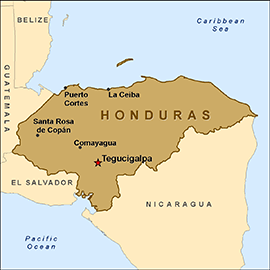On June 9, 2014, the Executive Board of the International Monetary Fund (IMF) concluded the Article IV consultation with Honduras. Under Article IV of the IMF’s Articles of Agreement, the IMF holds bilateral discussions with members, usually every year.
A staff team visits the country, collects economic and financial information, and discusses with officials the country’s economic developments and policies. On return to headquarters, the staff prepares a report, which forms the basis for discussion by the Executive Board
Economic growth decelerated to 2.6 percent in 2013 (from about 4 percent in 2012), owing to lower private investment, a drop in coffee output due to leaf-rust disease, and weaker trade-partner growth.
Inflation declined to 5 percent (from 5½ percent in 2012), driven by softer commodity prices, weaker economic activity, and lower currency depreciation. On the external front, the current account deficit rose to about 9 percent of GDP in 2013, reflecting less favourable terms of trade and a drop in coffee exports.
This deficit was financed by FDI inflows and the placement of two global bonds totalling US$1 billion. These inflows allowed international reserves to rise to 3.7 months of imports.
The new government has started to implement measures to improve fiscal discipline. A substantial package of fiscal consolidation measures focused on increasing revenue was approved by the outgoing congress in December 2013.
For 2014, economic activity is expected to grow at 3 percent, supported in part by more favourable external conditions.
Inflation is projected to temporarily pick up, but should remain under control and decline in 2015. The combined public sector deficit is expected to be reduced to 6.2 percent of GDP, supported by higher tax revenues and lower primary spending.
The external current account deficit would decline to slightly over 8 percent of GDP, reflecting more favourable external conditions and fiscal adjustment.
Source: IMF


















